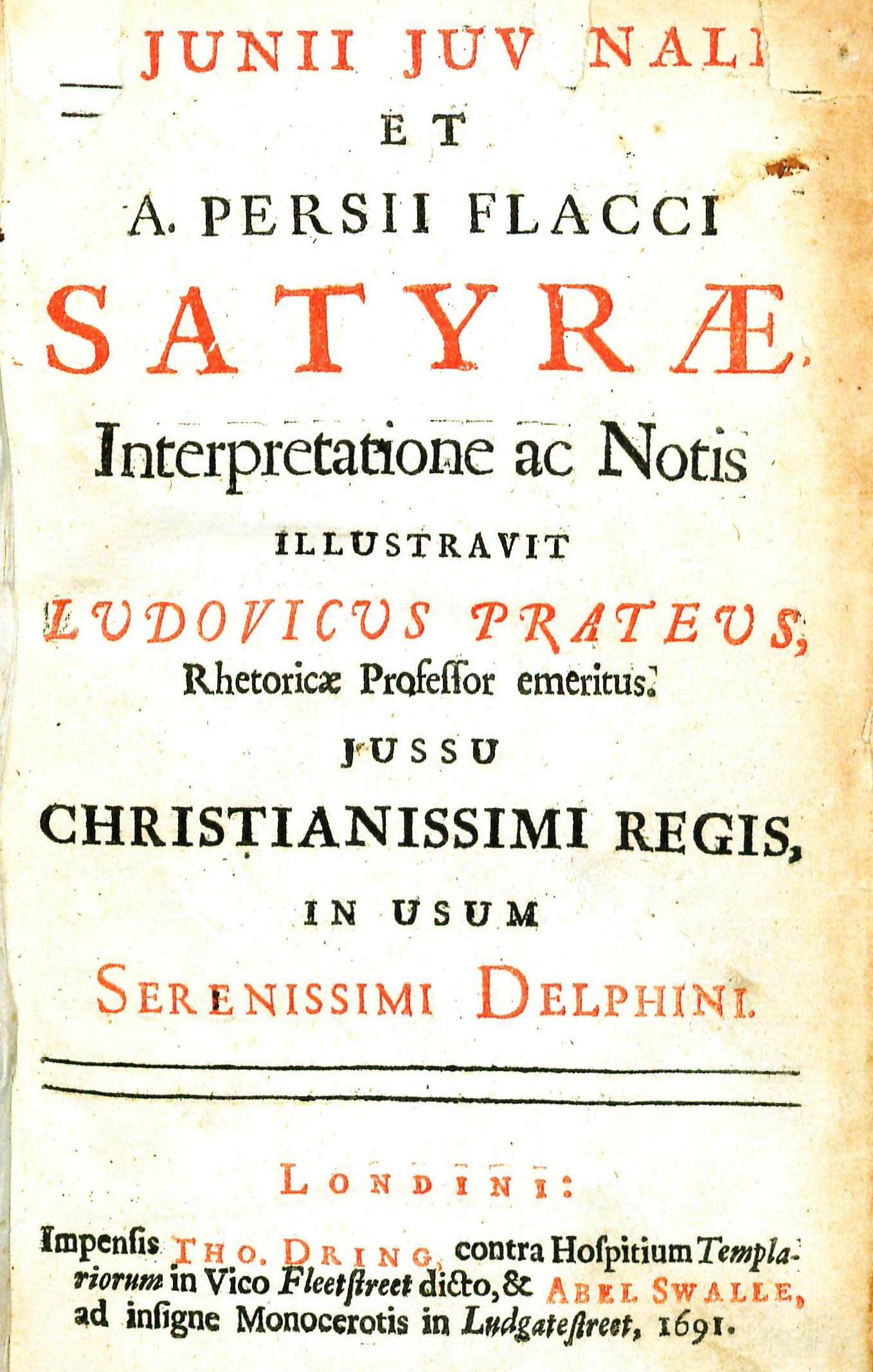D. Junii Juvenalis et A. Persii Flacci Satyrae
by Juvenal and Persius
| D. Junii Juvenalis et A. Persii Flacci Satyrae | |
|
Title page from D. Junii Juvenalis et A. Persii Flacci Satyrae, George Wythe Collection, Wolf Law Library, College of William & Mary. | |
| Author | Juvenal and Persius |
| Published | Londini: Impensis Tho. Dring, contra Hospitium Templariorum in vico Fleetstreet dicto, & Abel Swalle, ad insigne Monocerotis in Ludgatestreet |
| Date | 1691 |
| Language | Latin |
| Pages | [16], 320, 319-414, [92] |
| Desc. | 8vo |
| Location | Shelf J-4 |
Historians believe Juvenal (Decimus Iunius Iuvenalis), c. 55 C.E. – 140 C.E., was probably a native Italian, born in Aquinum (modern day Aquino, in southern Italy).[1] His parents were not noble, but were likely free-born. We know nothing of Juvenal’s middle age, but historians surmise that he lived in relative poverty, as his Satyrae shows a "greater knowledge of poverty than any other Roman author possessed."[2] Martial, a Roman poet and Juvenal’s contemporary, mentions Juvenal twice.[3]
Juvenal wrote Satyrae (The Satires) c. 100-130 C.E.; scant datable references in the work make more precise dating impossible. The Satires is series of 16 satirical poems, divided between 5 books. The poems meditate on life in Rome under the Emperor Domitian, and his successors. The Satires are especially well known for their uniquely caustic style, which is often contrasted with the urbane and witty style of Juvenal’s predecessor, Horace.[4] Some of Juvenal’s popular wisdom remains in common parlance today. We have Juvenal to thank for the maxims: "who will guard the guards themselves?" (sed quis custodiet ipsos custodies?), and "only two things does [the modern citizen] anxiously wish for—bread and circuses" (…duas tantum res anxius optat, panem et circenses).[5]
Persius (Aulus Persius Flaccus) was born in Volterrae, Etruria (close to modern-day Florence) on 4 December 34 CE. He was a member of a well-established family and came to Rome at the age of twelve to study under Cornutus (a Stoic, and a successful teacher of rhetoric and philosophy). A contemporary biographer described Persius as “infrequently” composing Roman satire, and only late in his short life.[6] The entire corpus of Persius’s work runs to a mere 650 lines of hexameter verse. Persius died at the age of twenty-eight in 62 CE.
Evidence for Inclusion in Wythe's Library
Listed in the Jefferson Inventory of Wythe's Library as "Juvenalis et Persius. Delph. 8vo." and given by Thomas Jefferson to his grandson Thomas Jefferson Randolph. The Brown Bibliography[7] lists the 1699 Delphini edition published in London. George Wythe's Library[8] on LibraryThing states "Precise edition unknown. Several editions were published, the first in 1691." Dean's Memo suggests Wythe read Ivn, Ivvenalis Satyrae XVI. A. Persil Satyrae VI. Ad Vetustiss, Scripta Exeplaria Emendatae: quorum Varias Lectiones ad Calcem Reiecimus, published in Paris (Lvtetiae) in 1544.[9] Since the edition Wythe owned cannot be determined, the Wolf Law Library purchased an available copy of 1691 Delphini edition published in London.
Description of the Wolf Law Library's copy
Bound in contemporary calf with stamped rule and filigree design to cover, five bands to spine.
Images of the library's copy of this book are available on Flickr. View the record for this book in William & Mary Online Catalog
See also
References
- ↑ Gilbert Highet, "The Life of Juvenal," Transactions and Proceedings of the American Philological Association 68, (1937): 485, accessed October 16, 2014.
- ↑ Ibid.
- ↑ The Hutchinson Unabridged Encyclopedia, s.v. "Juvenal (c. AD 60-140)" (Abington: Helicon, 2014), accessed October 16, 2014.
- ↑ The Concise Oxford Companion to English Literature, s.v. "Juvenal," ed. Dinah Birch and Katy Hooper (Oxford: Oxford University Press, 2012).
- ↑ Oxford Essential Quotations, s.v. "Juvenal," ed. Susan Ratcliffe (Oxford: Oxford University Press, 2014), accessed October 16, 2014.
- ↑ William S. Anderson, "Persius (A.D. 34–62) Juvenal (A.D. 60?–140?)" in Ancient Writers: Greece and Rome Vol. 2, ed. T. James Luce (New York: Charles Scribner's Sons, 1982), 858.
- ↑ Bennie Brown, "The Library of George Wythe of Williamsburg and Richmond," (unpublished manuscript, May, 2012, rev. May, 2014) Microsoft Word file. Earlier edition available at: https://digitalarchive.wm.edu/handle/10288/13433.
- ↑ LibraryThing, s.v. "Member: George Wythe," accessed on February 3, 2015.
- ↑ Memorandum from Barbara C. Dean, Colonial Williamsburg Found., to Mrs. Stiverson, Colonial Williamsburg Found. (June 16, 1975), 10 (on file at Wolf Law Library, College of William & Mary).
